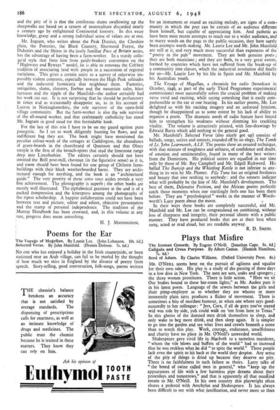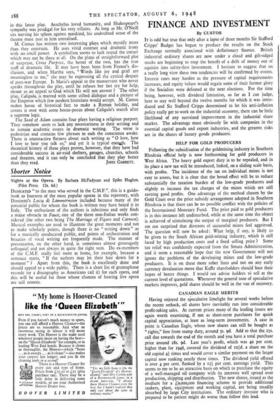Plays that Misfire
Seed of Adam. By Charles Williams. (Oxford University Press. 6s.) MR. O'NEILL seems bent on the pursuit of ugliness and squalor for their own sake. His play is a study of the passing of three days in a low dive in New York, The men are sots, soaks and spongers ; the three women prostitutes. There is little action. " Here we sit Our bodies bound to these bar-room lights," as Mr. Auden puts it in his latest poem. Language of the sewers between the girls and their pimp-employer as to whether they are whores or more innocently plain tarts produces a flicker of movement. There is sometimes a bite of mordant humour, as when one whore says good- naturedly to her colleague: " Jets, Cora, if all de guys you've stayed wid was side by side, yuh could walk on 'em from here,to Texas." In this ghetto of the damned men drink themselves to sleep, and only wake to beg more drink, and then sleep again. It is simpler to go into the garden and see what lives and crawls beneath a stone than to watch this play. Work, courage, endurance, unselfishness and charity have no place in Mr. O'Neill's unweeded world.
Shakespeare gave vivid life in Macbeth to a nameless murderer, " whom the vile blows and buffets of the world " had so incensed that he was reckless what he did " to spite the world." These people lack even the spirit to hit back at the world they despise. Any sense of the pity 'of things is dried up because they deserve no pity. There is no faithfulness in such failure as theirs. Larry talks of " the breed of swine called men in general," who "keep up the appearances of life with a few harmless pipe dreams about their yesterdays and tomorrows," and that is apparently all that mankind means to Mr. O'Neill. in his own country this playwright often shares a pedestal with Aeschylus and Shakespeare. It has always been difficult to see with what justification, and never more so than
in this latest play. Aeschylus loved humanity, and Shakespeare's sympathy was prodigal for his very villains. As long as Mr. O'Neill sits nursing his spleen against mankind, his undoubted sense of the theatre must rust in him unrealised.
M. Camus has written two interesting plays which mystify more than they entertain. He uses vivid contrast and dramatic irony with no small power. A symbolism seems to lurk round the corner which may not be there at all. On the plane of straightforward plot of suspense, Cross Purpose, the better of the two, has the true stuff of dramatic life. If may have been born from France's dis- illusion, and when Martha says, " Words like joy and grief are meaningless to me," she may be expressing all the cynical despair of post-war Europe. Is Maria's appeal to the manservant who never speaks throughout the play, until he refuses her last cry for help, meant as an appeal to God which He will not answer ? The other play, Caligula, is marred with some stilted dialogue and a picture of the Emperor which few modern historians would accept. M. Camus makes havoc of historical fact to make a Roman holiday, and covers it over with some hocus-pocus about Caligula's search after a supreme logic.
The Seed of Adam contains four plays having a religious purport. They somehow seem to lack any necessariness in their writing and to remain academic essays in dramatic writing. The verse is pedestrian and contains few phrases to stab the conscience awake. There is unattractive flatness about such writing as " 0 love, how I love to hear you talk so," and yet it is typical enon,gh. The theatrical history of these plays proves, however, that they have had considerable success in air-raid shelters, garages, churches, schools and theatres, and it can only be concluded that they play better



































 Previous page
Previous page